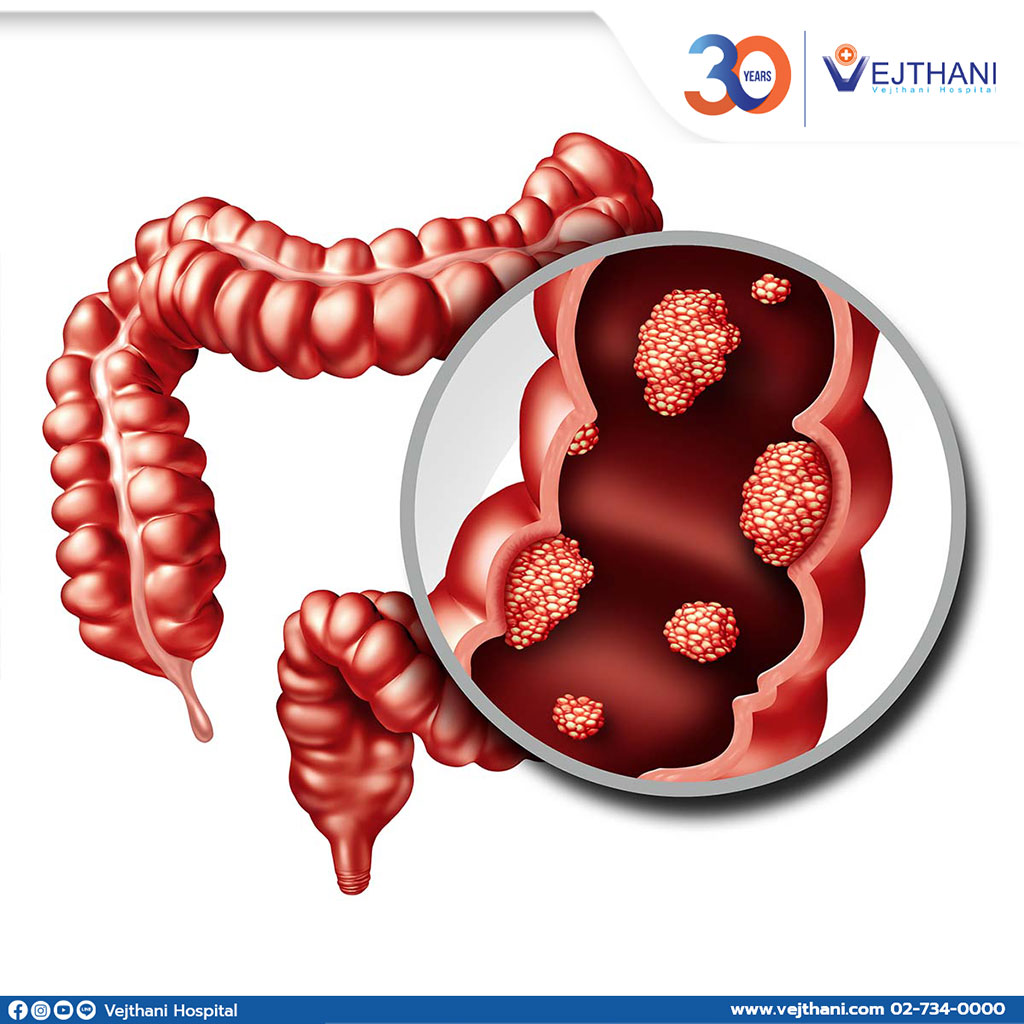
Colon cancer


Cancer that initially develops in the large intestine (colon) is called colon cancer. Colon is the last part of the digestive tract.
Colon cancer is commonly found in elders. However, patients of any age can have the disease. Colon cancer generally starts with small, noncancerous accumulations of cells, known as polyps. These occur on the inside of the colon. As time progresses, these polyps can develop into colon cancers.
Most patients with colonic polyp are asymptomatic. Therefore, regular screening tests are recommended in order to prevent colon cancer by detecting and removing polyps before they develop into cancer.
Treatment options for colon cancers are surgery, radiation therapy, chemotherapy, targeted therapy, and immunotherapy.
Colon cancer is also known as colorectal cancer. The term implies the combination of colon cancer and rectal cancer, which starts in the rectum.
Signs and symptoms
- A constant change in the bowel habits such as diarrhea, constipation
- Change in stool consistency
- Rectal bleeding, dark stool or blood in the stool
- Continuous abdominal discomfort such as cramps, bloatingor pain
- A feeling of incomplete bowel
- Fatigue or weakness
- Unexplained weight loss
Early-stage of colon cancer is usually asymptomatic until the disease has progressed to the late stage.
Causes
The definite causes of colon cancer are unknown. The mutation in DNA of colon cells causes uncontrolled duplication resulting in forming a mass of cells also known as a tumor. This tumor then begins to invade and destroy the healthy cells and tissues. These cells have the tendency to metastasize (spread to other parts of the body).
Risk factors
- Age. Colon cancer tends to be found in patients of any age but most of the people who have been diagnosed are above 50 years. Nevertheless, the percentage of colon cancer detected in people younger than 50 years old is rising.
- African-American race. African-American has a higher risk of developing colon cancer.
- Personal record of colorectal cancer or polyps. Having colon cancer or noncancerous colon polyps previously increase the risk of getting colon cancer in the future.
- Inflammatory intestinal conditions. Having chronic inflammatory diseases such as ulcerative colitis and Crohn’s disease, raises the chance of getting colon cancer.
- Inherited syndromes. Certain gene mutations pass down to generations which puts a greater risk in developing colon cancer. The syndromes include familial adenomatous polyposis (FAP) and Lynch syndrome, which is also known as hereditary nonpolyposis colorectal cancer (HNPCC).
- Family history of colon cancer. People with a first-degree relative (parent, sibling, or child) with colon cancer increase the risk of developing colon cancer. If more than one family member has colon cancer or rectal cancer, your risk is even greater.
- Low-fiber and high-fat diet. This kind of diet could put patients at risk of developing colon cancer and rectal cancer. Certain studies have revealed that high consumption of red meat and processed meat could also be a contributing factor for colon cancer to occur.
- Inactive lifestyle. People living a sedentary lifestyle are likely to have colon cancer. Consistent physical activities may decrease the chance of developing the disease.
- Diabetes. Diabetic patients or people who are resistant to insulin are at great risk of colon cancer.
- Obesity. Being obese puts patients at risk of colon cancer
- Smoking. Smoking increases the risk of having colon cancer.
- Alcohol. Heavy consumption of alcohol raises the risk of getting colon cancer.
- Radiation therapy for cancer. Radiation therapy applied to the abdomen for previous cancer treatment increases the chance of having colon cancer.























